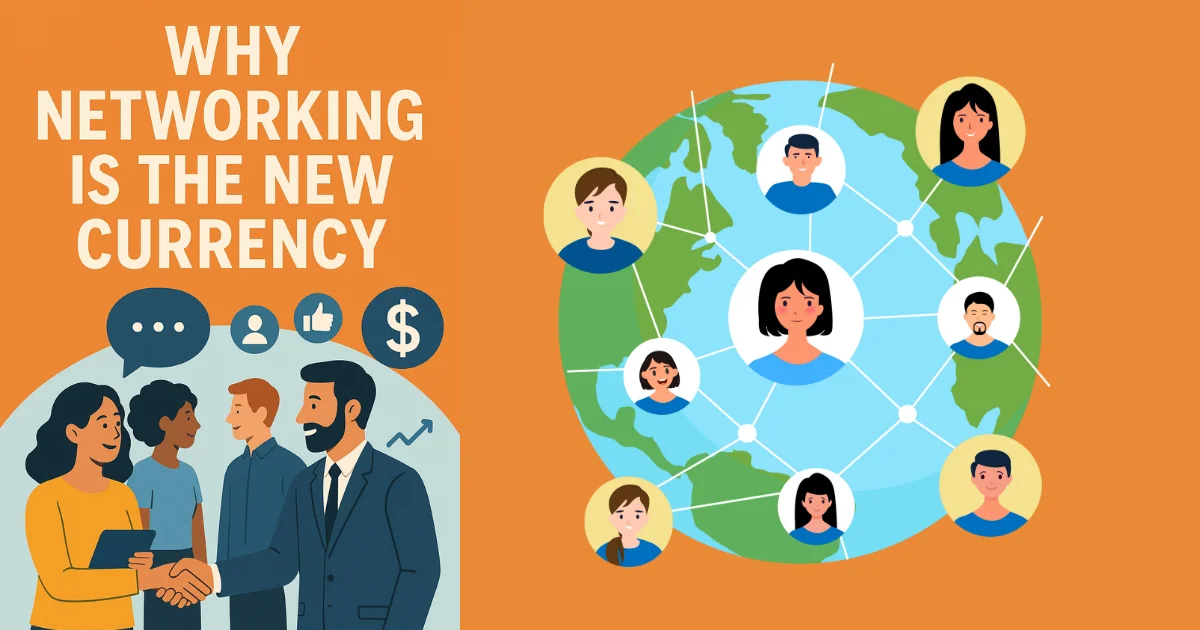The Evolution of Networking in the Digital Age: From Handshakes to Hashtags
In the past, networking was only possible in person at conferences, local clubs, or business meetings. Social media has changed the way we engage with each other today. A single LinkedIn post can reach thousands of people in your field, and a conversation on Twitter can lead to a long-term partnership.
Why relationships are the key to opportunities now
In a time where knowledge is free and easy to get, relationships are what set people apart. People are different not only because of their skills, but also because they can make real relationships that lead to partnerships, referrals, and collaborations.
The worth of social capital: What is social capital in business?
Social capital is the knowledge, access, and chances you get from your network. Social capital rises the more you use it, unlike money capital.
Trust and Reputation as the New Money
People often know about you before you do. When people trust someone, they are more willing to work with them. This makes credibility a valuable sort of currency.
Why Networking is the New Currency for Career Growth: Access to Hidden Job Markets
Studies demonstrate that networking, not public job ads, fills up to 85% of jobs. Referrals, insider connections, and trustworthy recommendations are what make the “hidden job market” work.
Help and advice from a mentor
Mentors provide you fast cuts to success by sharing knowledge and expertise that you can’t find in books. These connections can help you get ahead in your job and avoid making costly blunders.
Networking as a Way for Entrepreneurs to Grow: Partnerships and Collaborations
A lot of the time, entrepreneurs don’t succeed because they have the best product; they succeed because they have the perfect partners. Strategic relationships can help you get into new markets, find new technology, and find new resources.
Money and Relationships with Investors
Angel investors and venture capitalists usually put money into entrepreneurs they know or founders who have been recommended to them by someone they trust. Networking is the link between ideas and money.
Networking for personal branding: being noticed and having an impact
It’s not only about who you know; it’s also about who knows you. When possibilities come along, your name will be at the front of people’s minds if you have a strong personal brand.
How to Build Authority in Your Niche
Talking to people, giving your thoughts, and helping others all the time gives you authority. Having authority brings both chances and respect.
How Networking Can Help You Learn and Come Up with New Ideas
Sharing Information Between Industries
Networking brings together people with different points of view. When ideas from diverse fields come together, new things often happen.
Working together to solve problems
There isn’t usually just one answer to a hard situation. Networks let people brainstorm and share their ideas, which can lead to new ideas.
LinkedIn, Twitter, and Online Communities: Networking in the Digital World
LinkedIn and Twitter are more than just social networks; they may help you get forward in your job. Slack groups, Discord servers, and specialty forums are examples of online communities that encourage people to work together.
How virtual networking gets rid of barriers
Virtual networking gets rid of constraints based on where you are. You can now partner with people on other continents without ever meeting them in person.
Strong networks can help you emotionally and give you support when things go tough.
Networking isn’t just about doing business. Real relationships help you deal with changes in your work, problems with your business, or personal setbacks.
Boost in Motivation and Confidence
Being among individuals who are ambitious and supportive can help you stay motivated. When we know we’re not the only ones on our trip, our confidence typically improves.
Attend industry events and conferences to build networking currency in real life.
There is no substitute for talking to people in person. Conferences provide people a chance to have real conversations that go beyond LinkedIn messaging.
Use online networking sites to your advantage
Be real when you engage—leave intelligent comments, share useful information, and offer help. You will become a trusted member of your community over time.
Give Before You Ask
Reciprocity is what makes networks strong. Before asking for anything in return, offer support, make introductions, and give value.
Things to Avoid When Networking: Transactional vs. Relational Mindset
Networking is more than just getting business cards; it’s about making long-term connections. Don’t just think about “what’s in it for me.”
Not Following Up
Not following up is one of the biggest mistakes people make. Sending a short message after meeting someone can make the difference between being remembered and forgotten.
The Future of Networking: Web3 and Beyond Decentralized Communities
Web3 is changing networking to decentralized communities where people work together to produce, share, and benefit from possibilities.
Making connections in the Metaverse
Think of going to a meeting in a virtual world instead of a hotel ballroom. The metaverse promises to change the way we interact, work together, and trust one other.
Conclusion: the wealth of connections
Networking is the new money in today’s linked world. Money can help you get in, but solid relationships keep you there. The wealth of your network will frequently define the wealth of your future, whether you’re moving forward in your career, starting a business, or just looking for growth.
You can establish a network that makes your life better as well as your wallet by focusing on honesty, giving back, and being consistent.
Frequently Asked Questions about Networking as the New Currency
1. Why do people think networking is more important than money these days?
People, not money, are frequently the ones who give you chances, mentor you, and work with you. A strong network can help you make money, but money alone can’t buy trust or respect.
2. What can introverts do to be good at networking?
Introverts do better when they have intimate, one-on-one talks instead of talking to a lot of people at once. Online platforms also make it easy to make real contacts.
3. What's the difference between creating relationships and networking?
Introductions are the first step in networking, but cultivating relationships goes deeper by creating trust, support, and long-term value exchange.
4. How often should I be meeting new people?
Making small, steady efforts over time will give you the rewards. It’s not something you do once in a while; it’s everyday.
5. Can networking be used instead of applying for jobs?
Networking will greatly improve your chances of getting job offers through referrals and contacts from people you know, it won’t fully replace applications.
6. What are some quick ways to network well?
Be real, listen more than you talk, follow up, give value first, and take care of your relationships on a regular basis.

Business Consultant | Web designer & Developer | Social media Manager | SEO | Passionate Learner, I am deeply passionate about learning and continuously improving my skills.
My interests are diverse, ranging from music and singing to computers and programming languages, digital art, AI


